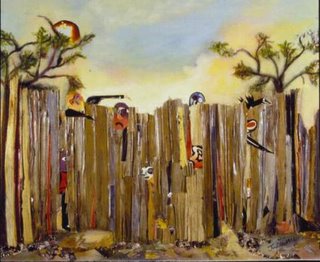Unacceptable; outside agreed standards of decency.
Origin:
Firstly, let's get get clear what word we are talking about here. It's pale, and certainly not pail, - the phrase has nothing to do with buckets. The everyday use of the word pale is as the adjective meaning whitish and light in colour (and used to that effect by Procol Harum and countless paint adverts). This pale is the noun meaning 'a stake or pointed piece of wood'. It is virtually obsolete now except in this phrase, but is still in use in the associated words paling (as in paling fence) and impale (as in Dracula movies).
The paling fence is significant as the term pale became to mean the area enclosed by such a fence and later just the figurative meaning of 'the area that is enclosed and safe'. So, to be 'beyond the pale' was to be outside the area accepted as 'home'.
Catherine the Great created a 'Pale of Settlement' in Russia in 1791. This was a western border region of the country in which Jews were allowed to live. The motivation behind this was to restrict trade between Jews and native Russians. Some Jews were allowed to live, as a concession, beyond the pale.
Pales were enforced in various other European countries for similar political reasons, notably in Ireland (the Pale of Dublin) and France (the Pale of Calais, which was formed as early as 1360).
The phrase itself comes later than that though. The first printed reference comes from 1657 in John Harington's lyric poem, The History of Polindor and Flostella.
In that work, the character Ortheris withdraws with his beloved to a country lodge for 'quiet, calm and ease', but later venture further - 'Both Dove-like roved forth beyond the pale to planted Myrtle-walk'. Such recklessness rarely meets with a good end in 17th century verse and before long they are attacked by armed men with 'many a dire killing thrust'. The message is clearly, 'if there is a pale, you should stay inside it', which conveys exactly the meaning of the phrase as it is used today.

-It's useless bits of trivia like this that give my life meaning and enjoyment!-

13 comments:
Interesting. I've always wondered about the phrase, actually, but never bothered to look it up. And now I don't have to. :)
I've added you to my blogroll. I hope you don't mind.
I love etymology.
I've heard that phrase and knew it had something to do with "the Pale," but I didn't know all the dates and details. Well done!
-- david
And Blackcrag is right -- etymology is better than entymology any day.
-- david
Personally, I want to use "many a dire killing thrust" somewhere in today's conversations.....
Actually, I've always wondered where that came from, so thanks! :-)
Learn something new every day! Nice post!
Hi, I had some notion that it was a punishment, but assumed it to be associated with a bucket and the Newgate stocks, given that when someone's behaviour is beyond the pale it tends to be imbecile.
NB I'll pop you on the blogroll. I could do with a dictionary :0)
Perhaps etymology is better than entymology because etymology actualy exists. Were you thinking of entomology, David?
oh i love finding out info like this!! thank you! i had actually never given that phrase a second thought, but i am infinitely happier now knowing what it's from :-)
Oooo! A new word and phrase. I live for this kind of thing!!!! (Yes, I'm a geek. But I'm a Happy geek.)
Post a Comment